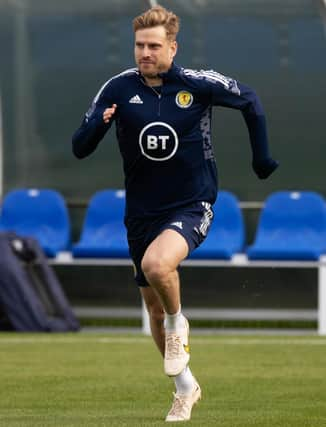Ukraine continuing to play through war "admirable" but Scotland must concentrate "purely on football", says midfielder


There was universal emotional support for the eastern Europeans ahead of the World Cup play-off on June 1. A heartfelt response over a return to international football as their nation and its people remained subjected to bombing and brutalisation following Russia’s invasion in February. Almost four months on, Ukraine remains embroiled in a fight for its self-determination, its very soul, in a war that continues to destroy lives and way of life. It is a conflict that feels without end. Yet, the country’s national team - and now its native clubs - must pursue their sporting objectives in as conventional a manner as possible. As is true for all Ukraine’s athletes. Every one of them has sought a sense of normality in the sporting arena; never seeking, what would be, an easy sympathy vote over their predicament. Scotland midfielder Stuart Armstrong doesn’t attempt to place himself in the headspace of Ukrainian international footballers. All the 30-year-old midfielder can offer is respect. “Being outwith the situation it's hard to comment, but of course it's admirable,” Armstrong said of how Scotland’s Nations League rivals have handled themselves. “For continuing…it must be very difficult for the country as a whole.”
Ukraine channelled a profound sense of purpose as they outplayed Steve Clarke’s men in the World Cup play-off and secured a 3-1 success, before falling short of reaching the Qatar finals in the Welsh decider only four days later. The Hampden occasion, in retrospect, was adjudged to have weighed heavier on the hosts than their - apparently - under-prepared opponents, but for Armstrong such an assessment simply does not stand up. “No, I wouldn't say so,” he said in response to whether Ukraine’s situation impacted on Scotland’s psychology on the evening. “Once the game starts it's purely football and everyone within our squad was aware of that. I think that goes for every fixture. There's always something on the exterior. Of course we were all aware of the magnitude of that. [But] I think when the game starts it's purely football and you put everything else outside of your mind. We had a look at that game when we first came in [for this Nations League triple header], along with the other games, and realised what we could do better in the future, and what went wrong.”
Advertisement
Hide AdAdvertisement
Hide AdScotland’s stuttering displays in June beyond their World Cup exit came with their Nations League assignments. These resulted in an excruciating 3-0 defeat away to the Republic of Ireland that was bookended by patchy wins over Armenia - the 4-1 away win to group’s basement team marked by Armstrong’s first international scoring double. Only wins home and away to Ukraine and against the Republic - in Glasgow on Saturday - will likely be sufficient to see Clarke’s men top their section and earn the fall-back of a guaranteed Euro 2024 play-off. “It'll definitely be difficult but we know it can be done,” said the attacker. “We're all in agreement that the summer games didn't go as planned. Obviously the Ukraine game, initially, and then Ireland. We need to put in better performances. We still have belief.”
A message from the Editor:
Thank you for reading this article. We're more reliant on your support than ever as the shift in consumer habits brought about by coronavirus impacts our advertisers. If you haven't already, please consider supporting our trusted, fact-checked journalism by taking out a digital subscription.
Comments
Want to join the conversation? Please or to comment on this article.